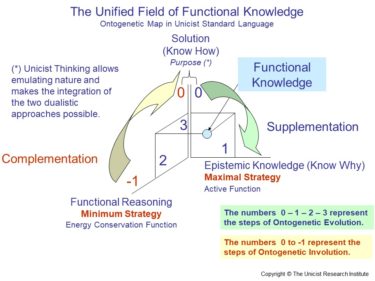The unicist evolutionary approach erased the barriers between philosophy, science and action to deal with reality as a unified field using the Unicist Logic (double dialectical logic).
It integrates
- The know-why of things, that cannot be contradictory with philosophy.
- The scientific approach to complex systems with open boundaries, that cannot be contradictory with empirical sciences.
- The know-how of things, that cannot be contradictory with operational cause-effect thinking.
This is a new “species” that was named “Complexity Sciences” which is based on a pragmatic, structuralist and functionalist framework that differs from the philosophical and empirical approaches to “things”.
It is based on the integration of Eastern and Western philosophies that requires using a superior abstraction and building a superior concretion.
It emulates the functionality of the ontogenetic intelligence of nature. It required integrating philosophy, sciences and actions in a unified field creating a new “species” of knowledge.
The resulting knowledge was named: Functional Knowledge. It is necessary to forecast and influence the evolution of adaptive environments which have, by definition, open boundaries. This approach allowed making possible what was not possible before (in terms of value generation in adaptive environments).
Peter Belohlavek
NOTE: The Unicist Research Institute has been, since 1976, the pioneer in complexity science research to deal with adaptive entities and became a private global decentralized leading research organization in the field of adaptive systems and environments. It was one of the precursors of the Industry 4.0 concept
